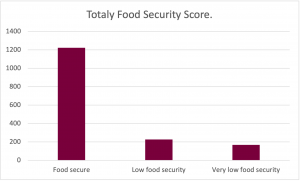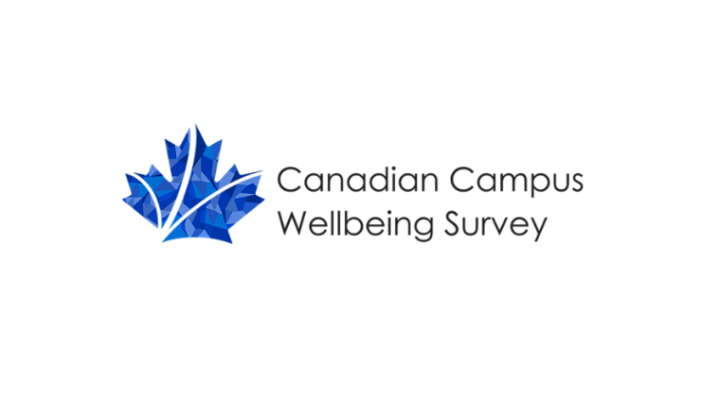Overview
The Canadian Campus Wellbeing Survey is the first surveillance tool that was specifically designed for Canadian post-secondary campus use. In the past Canadian institutions have used U.S. based tools such as the National College Health Assessment (NCHA) to assess the health and well-being needs of our campus populations. The Canadian Campus Wellbeing Survey represents a Canadian system for information sharing and analysis of institutional-level policies, practices and strategies relevant to campus mental and physical health.
In March 2020, 5,000 of McMaster’s undergraduate students and all of McMaster’s graduate students were invited to participate in the Canadian Campus Wellbeing Survey. Participants answered questions in the areas of demographics, campus climate, academic achievement, mental health, health service utilization, physical health, substance use, and food security. The results of that survey have been received by the Office of Institutional Research and Analysis. The results include the overall data of both undergraduate and graduate participants who were registered in the Fall 2019 academic term. These results help McMaster monitor its progress toward implementing the goals and values of the Okanagan Charter and McMaster University collectively.
Click on the tabs to view the 2020 survey results.
The CCWS administration at McMaster was approved by the Hamilton Integrated Research Ethics Board (#9472).
Questions?
If you are looking for more specific population results (e.g. gender or age) from the Canadian Campus Wellbeing Survey, please email us or contact the IRA office. If you have any additional questions or concerns, please contact Lynn Armstrong at okanagan@mcmaster.ca
Campus Climate
The statements below are questions from the Canadian Campus Wellbeing Survey for McMaster University. Click on each statement to view the results.
Expandable List
Participants were asked how much they agreed with the following statement: At my institution, I feel that students’ mental and emotional wellbeing is a priority.
Overall Results:
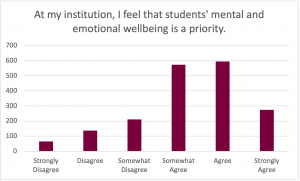
Participants were asked how much they agreed with the following statement: At my institution, I feel that the campus climate encourages free and open discussion about mental and emotional health.
Overall Results:
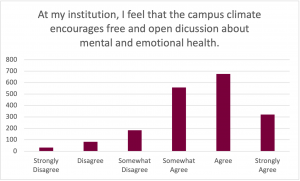
Participants were asked how much they agreed with the following statement: At my institution, the administration is listening to the concerns of students when it comes to mental health and wellbeing.
Overall Results:
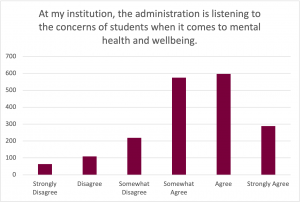
Participants were asked how much they agreed with the following statement: I have a group, community, or social circle at school where I feel I belong (feel at home, known, connected to, supported in my own identity).
Overall Results:
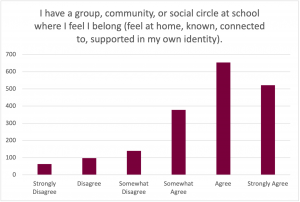
Participants were asked how much they agreed with the following statement: I feel that I belong on campus.
Overall Results:
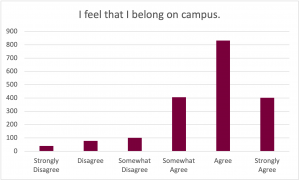
Participants were asked how much they agreed with the following statement: At my institution, I am respected regardless of my personal characteristics, identity or background (e.g., gender, ethnicity, international status, disability, etc).
Overall Results:
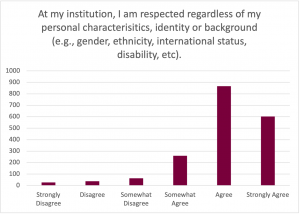
Participants were asked how much they agreed with the following statement: My institute is a respectful environment.
Overall Results:
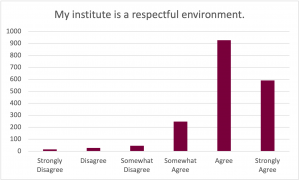
Participants were asked how much they agreed with the following statement: My institution values diversity.
Overall Results:
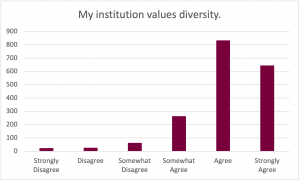
Participants were asked to respond to the prompt: How safe or unsafe do you feel on campus during the day?
Overall Results:
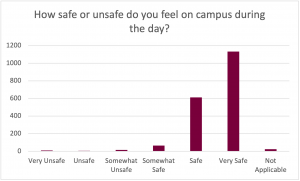
Participants were asked to respond to the prompt: How safe or unsafe do you feel on campus at night?
Overall Results:
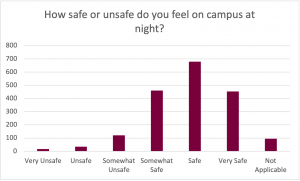
Academic Achievement
The statements below are questions from the Canadian Campus Wellbeing Survey for McMaster University. Click on each statement to view the results.
Expandable List
Participants were asked how much they agreed with the following statement: My institution provides a supportive learning environment.
Overall Results:
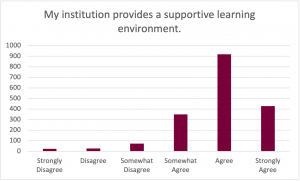
Participants were asked how much they agreed with the following statement: My institution uses teaching strategies designed to support learners.
Overall Results:
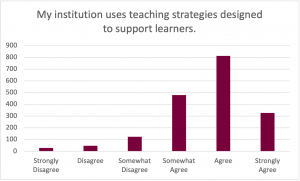
Participants were asked how much they agreed with the following statement: My institution provides opportunities for students to explore their full potential.
Overall Results:
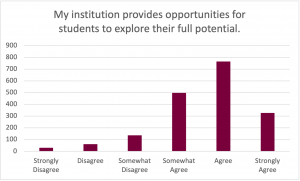
Participants were asked how much they agreed with the following statement: I am confident that I will be able to finish my academic program no matter what challenges I may face.
Overall Results:
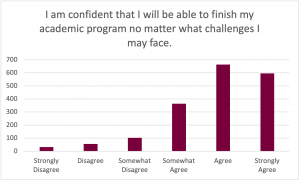
Mental Health Assets
The statements below are questions from the Canadian Campus Wellbeing Survey for McMaster University. Click on each statement to view the results.
Expandable List
Participants were asked how often they agree with the following statement: I’ve been feeling optimistic about the future.
Overall Results:
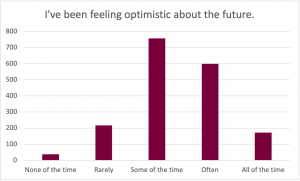
Participants were asked how often they agree with the following statement: I’ve been feeling useful.
Overall Results:
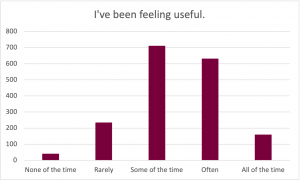
Participants were asked how often they agree with the following statement: I’ve been feeling relaxed.
Overall Results:
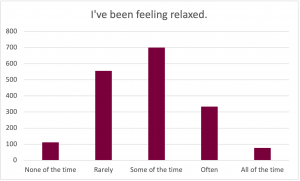
Participants were asked how often they agree with the following statement: I’ve been feeling interested in other people.
Overall Results:
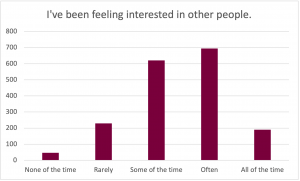
Participants were asked how often they agree with the following statement: I’ve had energy to spare.
Overall Results:
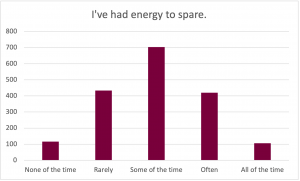
Participants were asked how often they agree with the following statement: I’ve been dealing with my problems well.
Overall Results:
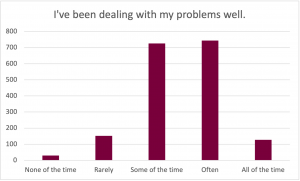
Participants were asked how often they agree with the following statement: I’ve been thinking clearly.
Overall Results:
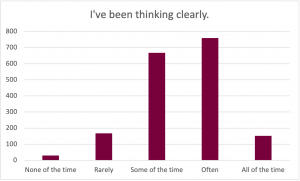
Participants were asked how often they agree with the following statement: I’ve been feeling good about myself.
Overall Results:
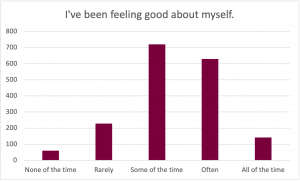
Participants were asked how often they agree with the following statement: I’ve been feeling close to other people.
Overall Results:
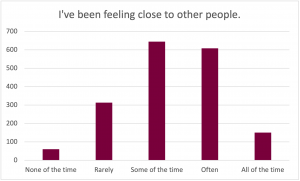
Participants were asked how often they agree with the following statement: I’ve been feeling confident.
Overall Results:
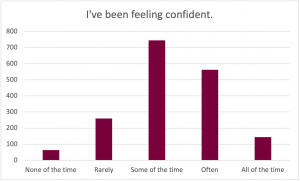
Participants were asked how often they agree with the following statement: I’ve been able to make my mind up about things.
Overall Results:
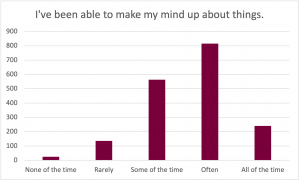
Participants were asked how often they agree with the following statement: I’ve been feeling loved.
Overall Results:
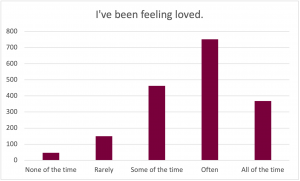
Participants were asked how often they agree with the following statement: I’ve been feeling interested in new things.
Overall Results:
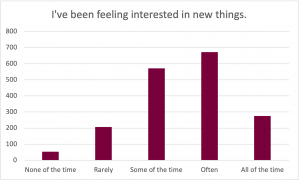
Participants were asked how often they agree with the following statement: I’ve been feeling cheerful.
Overall Results:
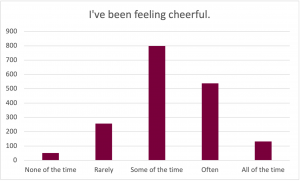
Overall Results:
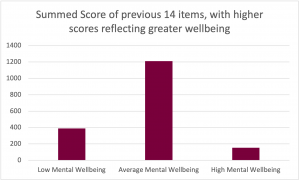
Participants were asked to rate their ability to do the following statement: Your ability to handle unexpected and difficult problems (a family or personal crisis).
Overall Results:
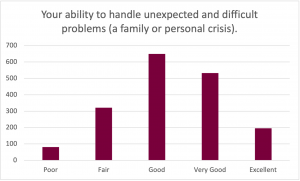
Participants were asked to rate their ability to do the following statement: Your ability to handle day-to-day demands in your life (work, family responsibilities).
Overall Results:
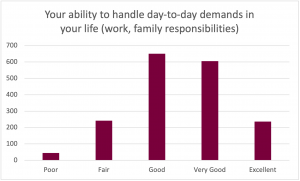
Participants were asked to rate themselves for the following statement: Your physical health.
Overall Results:
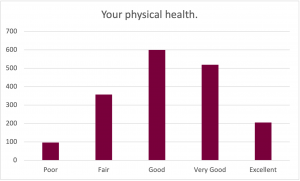
Participants were asked to rate themselves for the following statement: Your mental health.
Overall Results:
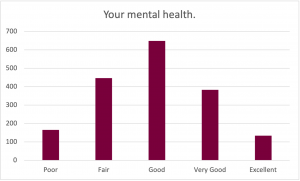
Mental Health Deficits
The statements below are questions from the Canadian Campus Wellbeing Survey for McMaster University. Click on each statement to view the results.
Expandable List
Participants were asked how much they view the following statement as an obstacle: Financial pressures or work obligations.
Overall Results:
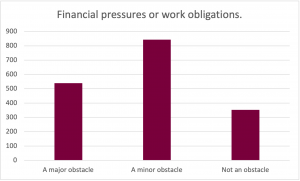
Participants were asked how much they view the following statement as an obstacle: Personal or family problems.
Overall Results:
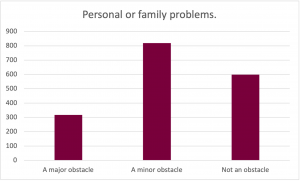
Participants were asked how much they view the following statement as an obstacle: Your academic performance at your post-secondary institution.
Overall Results:
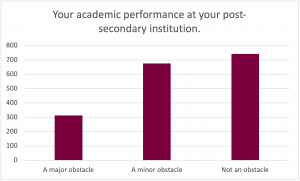
Participants were asked how much they view the following statement as an obstacle: Course availability/scheduling.
Overall Results:
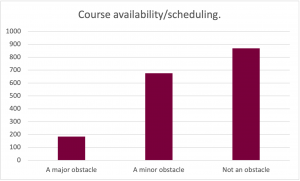
Participants were asked how much they view the following statement as an obstacle: Lack of good academic advising.
Overall Results:
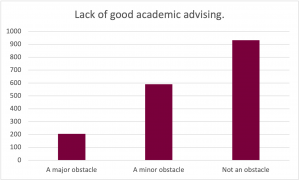
Participants were asked how much they view the following statement as an obstacle: Difficulties with academic workload.
Overall Results:
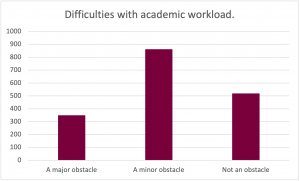
Participants were asked how much they view the following statement as an obstacle: Language/cultural barriers.
Overall Results:
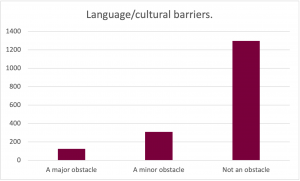
Participants were asked how much they view the following statement as an obstacle: Difficulties associated with a disability or chronic health condition.
Overall Results:
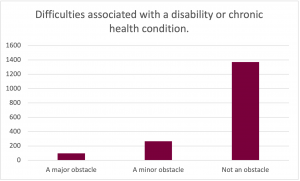
Participants were asked: Over the last 30 days, how often did you feel tired out for no good reason?
Overall Results:
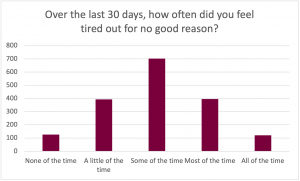
Participants were asked: Over the last 30 days, how often did you feel nervous?
Overall Results:
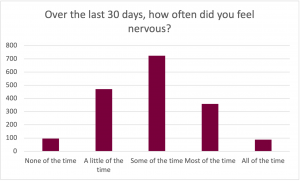
Participants were asked: Over the last 30 days, how often did you feel so nervous that nothing could calm you down?
Overall Results:
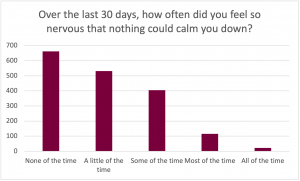
Participants were asked: Over the last 30 days, how often did you feel hopeless?
Overall Results:
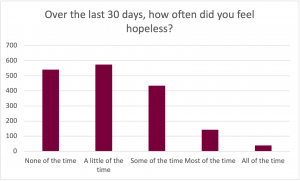
Participants were asked: Over the last 30 days, how often did you feel restless or fidgety?
Overall Results:
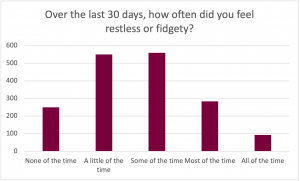
Participants were asked: Over the last 30 days, how often did you feel so restless you could not sit still?
Overall Results:
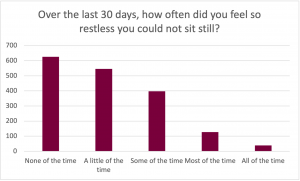
Participants were asked: Over the last 30 days, how often did you feel depressed?
Overall Results:
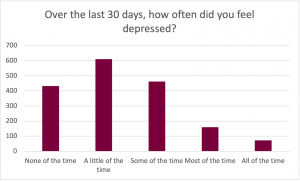
Participants were asked: Over the last 30 days, how often did you feel that everything was an effort?
Overall Results:
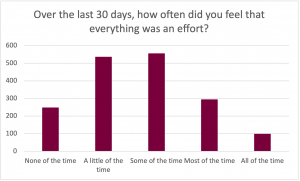
Participants were asked: Over the last 30 days, how often did you feel so sad that nothing could cheer you up?
Overall Results:
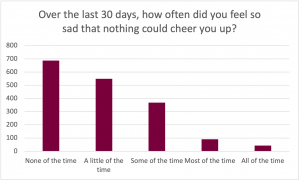
Participants were asked: Over the last 30 days, how often did you feel worthless?
Overall Results:
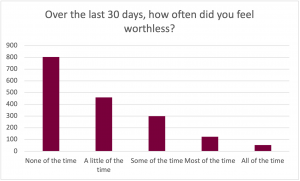
Summed score of the responses to the previous 10 items.
Overall Results:
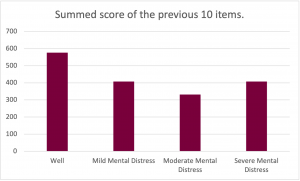
Participants were asked: In the past 12 months have you ever seriously thought about committing suicide or taking your own life?
Overall Results:
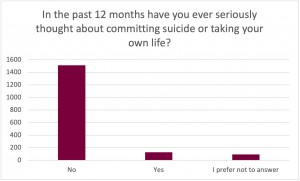
Participants were asked: If you answered yes to the previous question, in the past 12 months have you ever made a plan for committing suicide?
Overall Results:
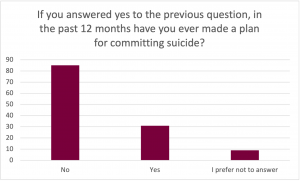
Health Service Utilization
The statements below are questions from the Canadian Campus Wellbeing Survey for McMaster University. Click on each statement to view the results.
Expandable List
Participants were asked how much they agree with the following statement: If I needed to seek professional help for my mental or emotional health, I would know where to go on campus.
Overall Results:
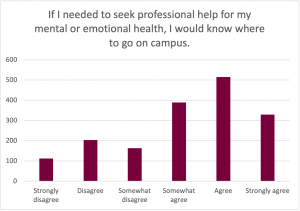
Participants were asked how much they agree with the following statement: If I needed to seek professional help for my mental or emotional health, I would know where to go off campus.
Overall Results:
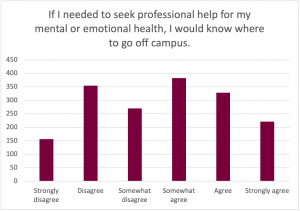
Participants were asked how much they agree with the following statement: If I needed to seek professional help for my physical health, I would know where to go on campus.
Overall Results:
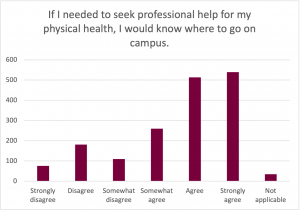
Participants were asked how much they agree with the following statement: If I needed to seek professional help for my physical health, I would know where to go off campus.
Overall Results:
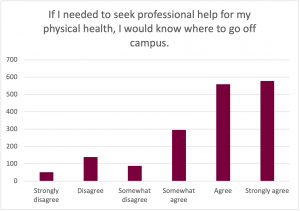
Participants were asked how much they agree with the following statement: There is a good support system on campus for students going through difficult times.
Overall Results:
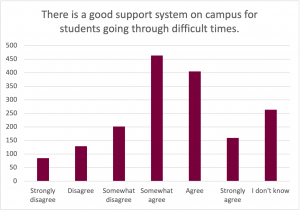
Participants were asked: Are you aware of mental health outreach efforts on your campus?
Overall Results:
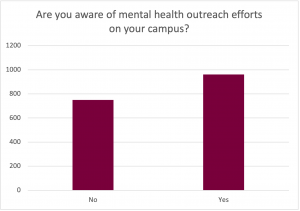
Participants were asked: Do you use campus health services for your primary care (such as routine check-ups with a doctor)?
Overall Results:
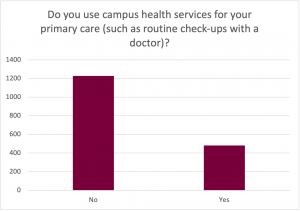
Participants were asked: If you were experiencing serious emotional distress, whom would you talk to about this? Select all that apply.
Overall Results:
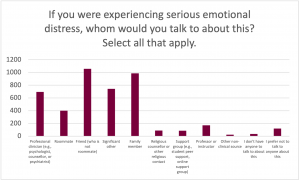
Sleep
The statements below are questions from the Canadian Campus Wellbeing Survey for McMaster University. Click on each statement to view the results.
Expandable List
Participants were asked: During the past week, what time have you usually turned out the lights and gone to sleep on weekdays?
Overall Results:
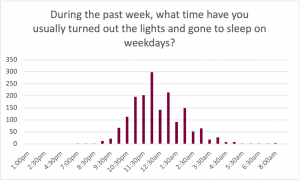
Participants were asked: During the pasts week, what time have you usually woken up in the morning on weekdays?
Overall Results:
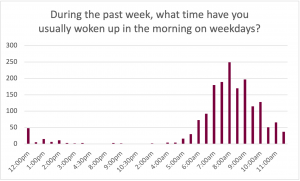
Participants were asked: During the past week, what time have you usually turned out the lights and gone to sleep on weekends?
Overall Results:
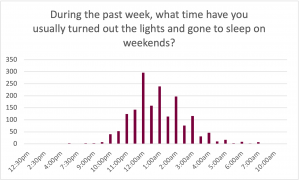
Participants were asked: During the past week, what time have you usually woken up in the morning on weekends?
Overall Results:
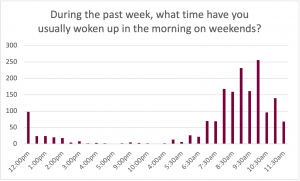
Participants were asked: During the past week, how would you rate your sleep quality overall (how well did you sleep)?
Overall Results:
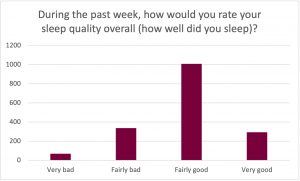
Calculated number of hours of sleep based on responses for sleep time and wake time on weekdays.
Overall Results:
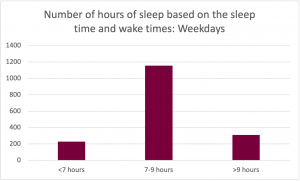
Calculated number of hours of sleep based on responses for sleep time and wake time on weekends.
Overall Results:
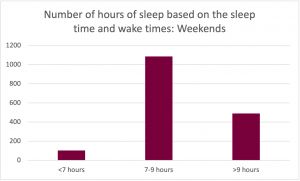
Physical Activity
The statements below are questions from the Canadian Campus Wellbeing Survey for McMaster University. Click on each statement to view the results.
Expandable List
Participants were asked: During the last 7 days, on how many days did you do vigorous physical activities like heavy lifting, digging, aerobics, or fast bicycling?
Overall Results:
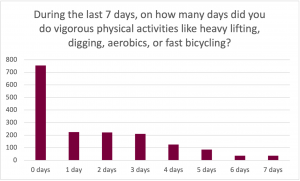
Participants were asked: How much time (in hours) do you usually spend doing vigorous physical activities on one of those days?
Overall Results:
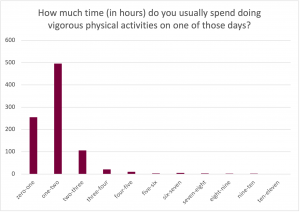
Participants were asked: During the last 7 days, on how many days did you do moderate physical activities like carrying light loads, bicycling at a regular pace, or doubles tennis?
Overall Results:
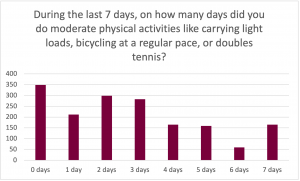
Participants were asked: How much time (in hours) did you usually spend doing moderate physical activities on one of those days?
Overall Results:
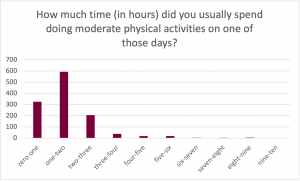
The sum of average times spent in vigorous and moderate activity per week.
Overall Results:
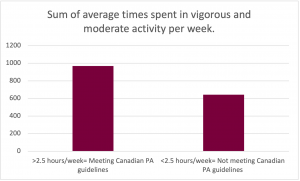
Participants were asked: Within the last 12 months, have you participated in organized sports at any of the following levels? Select all that apply.
Overall Results:
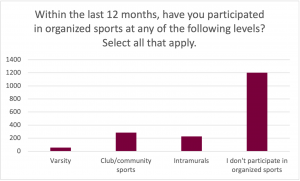
Sitting
The statements below are questions from the Canadian Campus Wellbeing Survey for McMaster University. Click on each statement to view the results.
Expandable List
Participants were asked: Time spent (in hours) per day watching TV or using a computer, tablet, or smartphone during your free time? (Do not include time spent on a computer for work or school).
Overall Results:
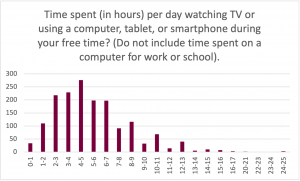
Participants were asked: Time spent (in hours) per day sitting and driving in a car, bus, or trains?
Overall Results:
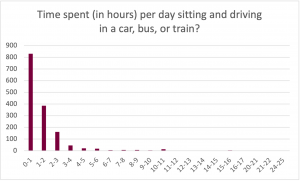
Participants were asked: During the last 7 days, how much time (in hours) did you usually spend sitting down during the full day?
Overall Results:
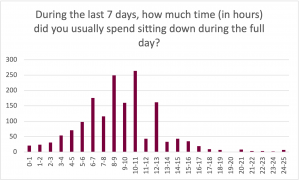
Substance Use
The statements below are questions from the Canadian Campus Wellbeing Survey for McMaster University. Click on each statement to view the results.
Expandable List
Participants were asked: During the past 30 days, how often have you had 4 or more drinks (female sex) or 5 or more drinks (male sex) on one occasion?
Overall Results:
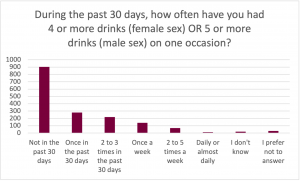
Participants were asked: During the past 12 months have you used cannabis?
Overall Results:
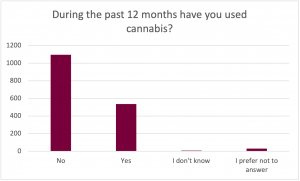
Participants were asked: If you answered yes to the previous question, in the past 30 days, how often did you use cannabis?
Overall Results:
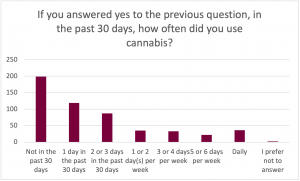
Participants were asked: In the past 12 months, have you used any pain relievers?
Overall Results:
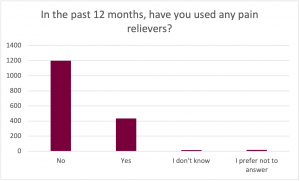
Participants were asked: If you answered yes to using pain relievers, during the past 12 months, have you used pain relievers for reasons other than for pain relief?
Overall Results:
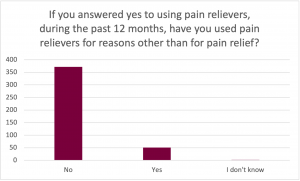
Participants were asked: If you answered yes to using pain relievers, were the pain relievers you have used prescribed for you?
Overall Results:
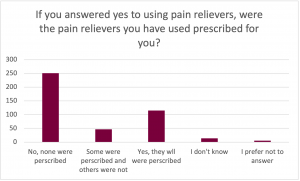
Participants were asked: In the past 12 months, have you used any stimulants?
Overall Results:
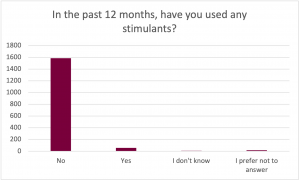
Participants were asked: If you answered yes to using stimulants, during the past 12 months did you use stimulants for reasons other than why they are recommended?
Overall Results:
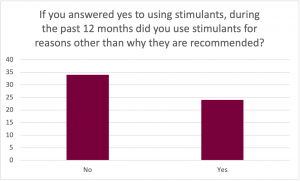
Participants were asked: If you answered yes to using stimulants, during the past 12 months, were all the stimulants you have used prescribed to you?
Overall Results:
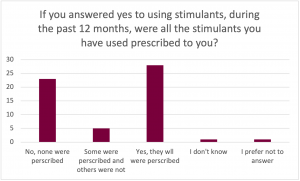
Overall Results:
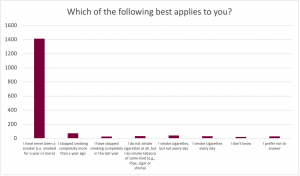
Participants were asked: During the past 30 days, how often did you use an e-cigarette or vaping device?
Overall Results:
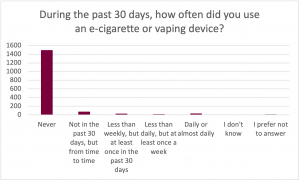
Participants were asked: On how many of the past 30 days did you vape an e-liquid with nicotine?
Overall Results:
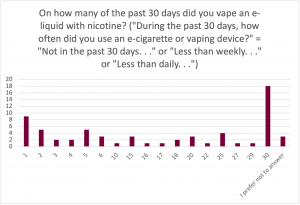
Participants were asked: On how many of the past 30 days did you vape cannabis/marijuana?
Overall Results:
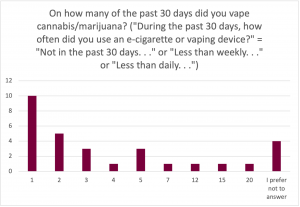
Participants were asked: On how many of the past 30 days did you vape just flavouring without nicotine?
Overall Results:
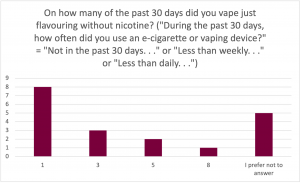
Food Security
The statements below are questions from the Canadian Campus Wellbeing Survey for McMaster University. Click on each statement to view the results.
Expandable List
Participants were asked how often the following statement is true: The food that (I/we) bought just didn’t last, and (I/we) didn’t have money to get more.
Overall Results:
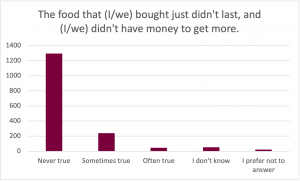
Participants were asked how often the following statement is true: I couldn’t afford to eat balanced meals.
Overall Results:
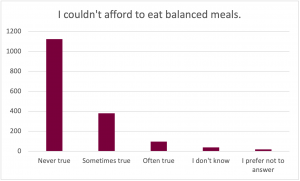
Participants were asked: Did you ever cut the size of your meals or skip meals because there wasn’t enough money for food?
Overall Results:
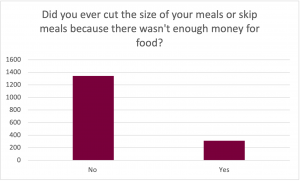
Participants were asked: If you answered yes to the previous question, how often did this happen?
Overall Results:
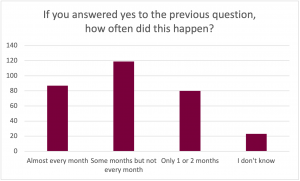
Participants were asked: Did you ever eat less than you felt you should because there wasn’t enough money for food?
Overall Results:
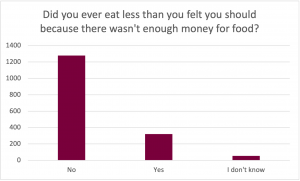
Participants were asked: Were you ever hungry but didn’t eat because there wasn’t enough money for food?
Overall Results:
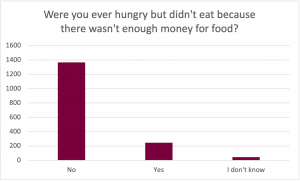
Total Food Security Score.
Overall Results:
